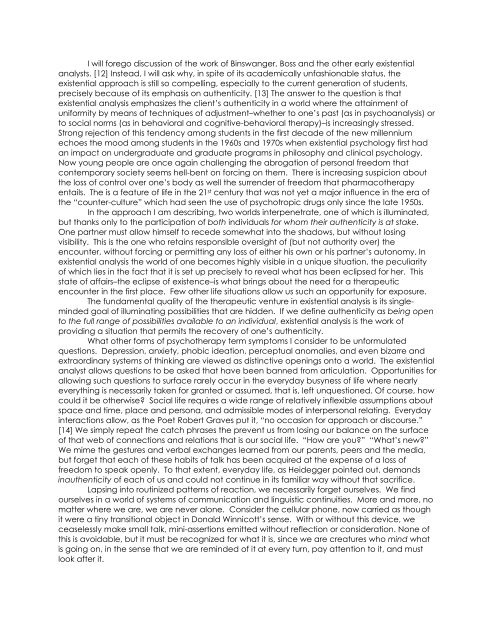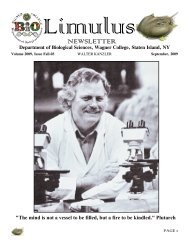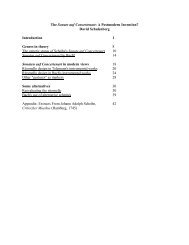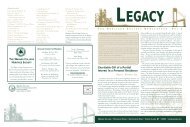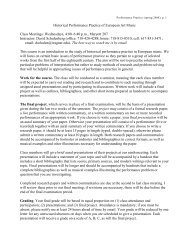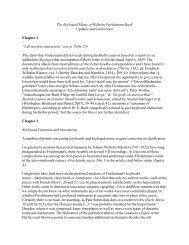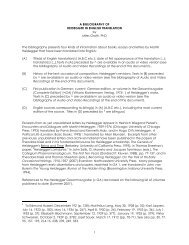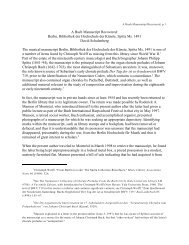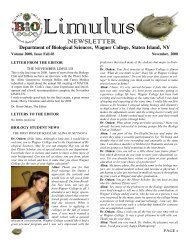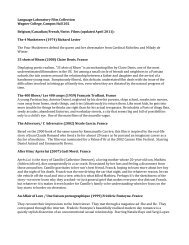SEVEN PAPERS ON EXISTENTIAL ANALYSIS ... - Wagner College
SEVEN PAPERS ON EXISTENTIAL ANALYSIS ... - Wagner College
SEVEN PAPERS ON EXISTENTIAL ANALYSIS ... - Wagner College
You also want an ePaper? Increase the reach of your titles
YUMPU automatically turns print PDFs into web optimized ePapers that Google loves.
I will forego discussion of the work of Binswanger, Boss and the other early existential<br />
analysts. [12] Instead, I will ask why, in spite of its academically unfashionable status, the<br />
existential approach is still so compelling, especially to the current generation of students,<br />
precisely because of its emphasis on authenticity. [13] The answer to the question is that<br />
existential analysis emphasizes the client’s authenticity in a world where the attainment of<br />
uniformity by means of techniques of adjustment–whether to one’s past (as in psychoanalysis) or<br />
to social norms (as in behavioral and cognitive-behavioral therapy)–is increasingly stressed.<br />
Strong rejection of this tendency among students in the first decade of the new millennium<br />
echoes the mood among students in the 1960s and 1970s when existential psychology first had<br />
an impact on undergraduate and graduate programs in philosophy and clinical psychology.<br />
Now young people are once again challenging the abrogation of personal freedom that<br />
contemporary society seems hell-bent on forcing on them. There is increasing suspicion about<br />
the loss of control over one’s body as well the surrender of freedom that pharmacotherapy<br />
entails. The is a feature of life in the 21 st century that was not yet a major influence in the era of<br />
the “counter-culture” which had seen the use of psychotropic drugs only since the late 1950s.<br />
In the approach I am describing, two worlds interpenetrate, one of which is illuminated,<br />
but thanks only to the participation of both individuals for whom their authenticity is at stake.<br />
One partner must allow himself to recede somewhat into the shadows, but without losing<br />
visibility. This is the one who retains responsible oversight of (but not authority over) the<br />
encounter, without forcing or permitting any loss of either his own or his partner’s autonomy. In<br />
existential analysis the world of one becomes highly visible in a unique situation, the peculiarity<br />
of which lies in the fact that it is set up precisely to reveal what has been eclipsed for her. This<br />
state of affairs–the eclipse of existence–is what brings about the need for a therapeutic<br />
encounter in the first place. Few other life situations allow us such an opportunity for exposure.<br />
The fundamental quality of the therapeutic venture in existential analysis is its singleminded<br />
goal of illuminating possibilities that are hidden. If we define authenticity as being open<br />
to the full range of possibilities available to an individual, existential analysis is the work of<br />
providing a situation that permits the recovery of one’s authenticity.<br />
What other forms of psychotherapy term symptoms I consider to be unformulated<br />
questions. Depression, anxiety, phobic ideation, perceptual anomalies, and even bizarre and<br />
extraordinary systems of thinking are viewed as distinctive openings onto a world. The existential<br />
analyst allows questions to be asked that have been banned from articulation. Opportunities for<br />
allowing such questions to surface rarely occur in the everyday busyness of life where nearly<br />
everything is necessarily taken for granted or assumed, that is, left unquestioned. Of course, how<br />
could it be otherwise? Social life requires a wide range of relatively inflexible assumptions about<br />
space and time, place and persona, and admissible modes of interpersonal relating. Everyday<br />
interactions allow, as the Poet Robert Graves put it, “no occasion for approach or discourse.”<br />
[14] We simply repeat the catch phrases the prevent us from losing our balance on the surface<br />
of that web of connections and relations that is our social life. “How are you?” “What’s new?”<br />
We mime the gestures and verbal exchanges learned from our parents, peers and the media,<br />
but forget that each of these habits of talk has been acquired at the expense of a loss of<br />
freedom to speak openly. To that extent, everyday life, as Heidegger pointed out, demands<br />
inauthenticity of each of us and could not continue in its familiar way without that sacrifice.<br />
Lapsing into routinized patterns of reaction, we necessarily forget ourselves. We find<br />
ourselves in a world of systems of communication and linguistic continuities. More and more, no<br />
matter where we are, we are never alone. Consider the cellular phone, now carried as though<br />
it were a tiny transitional object in Donald Winnicott’s sense. With or without this device, we<br />
ceaselessly make small talk, mini-assertions emitted without reflection or consideration. None of<br />
this is avoidable, but it must be recognized for what it is, since we are creatures who mind what<br />
is going on, in the sense that we are reminded of it at every turn, pay attention to it, and must<br />
look after it.


